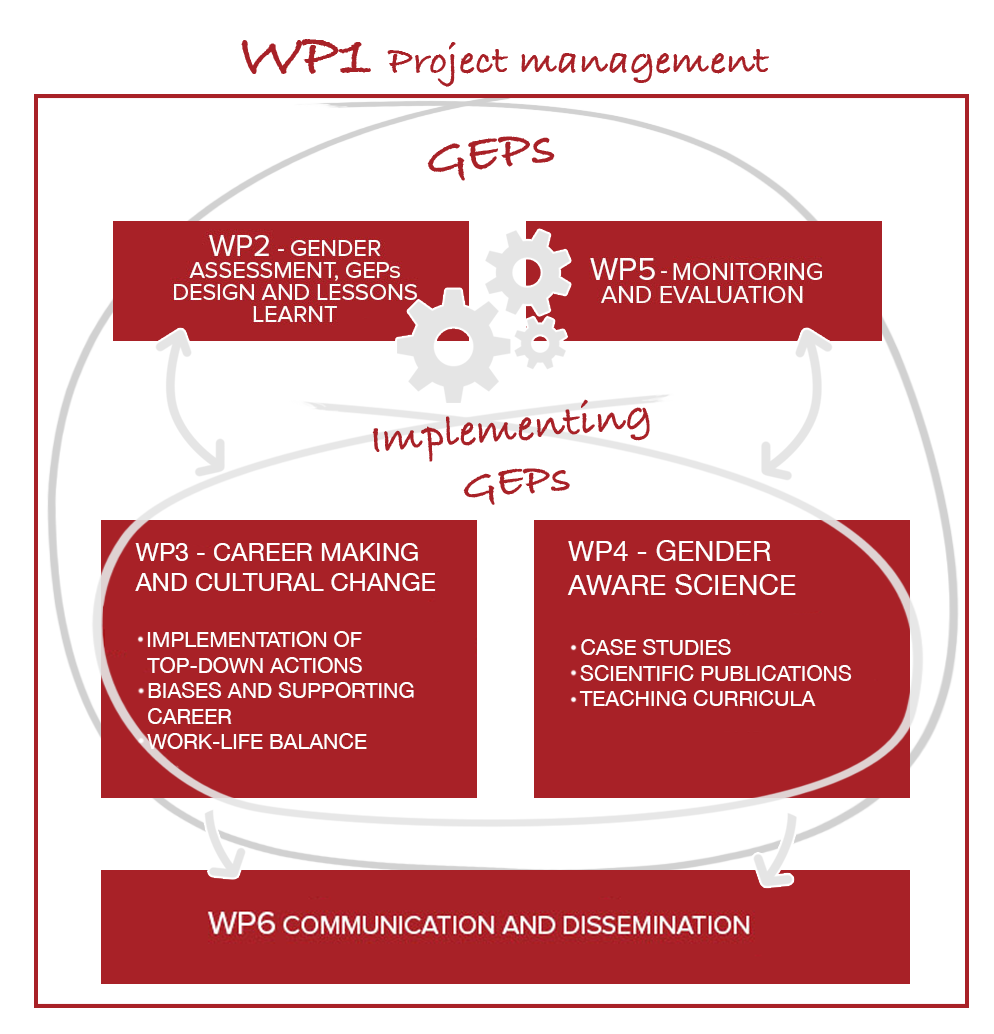PLOTINA WORKPACKAGES
WP 1 ensures the smooth implementation of all project activities.
WP 2, 3 and 4 form the core of PLOTINA proposed programme to address gender inequality in the academia including:
-
The assessment of the current RPOs Gender Equality context (WP 2)
-
The design and implementation of new actions (WP 3 and 4)
WP 5 is dedicated to impartially monitor and review progress.
Progresses and results of the WP 2 to 5 will be promoted and disseminated through the actions planned in WP 6.
WP 1 - Coordination and Management
Lead Beneficiary : UNIBO
The overall objective of the management WP1 is the smooth implementation of the project, and in particular: to coordinate and supervise activities to be carried out according to the work plan; to carry out the overall administrative and financial management of the project; to manage contracts with the EU Commission and the Consortium Agreement; to manage the knowledge generated by the project and the publications; to monitor quality and timing of project deliverables and to resolve conflicts; to establish effective internal and external communication procedures.
WP 2 - Gender Assessment, GEPs design and lessons learnt
Lead Beneficiary: Elhuyar
WP2 focuses on preliminary analysis of the baseline of the Partners and the European context together with the creation of methodology and tools that will be used in WP3 and WP4 to develop a Tool Kit for Partner and external PROs to use to support their development of Gender equality Plans (GEPs) tailored to their local situations. Tasks within WP2 includes
- Mapping and involving key actors in each RPO
- Carrying out the Audit procedure
- Defining indicators
- Designing GEPs for each partner
The Audit Tool and process for developing GEPs will be modelled on the ISO Quality Systems methodology and criteria, in particular, the Plan-Do-Check-Act Cycle. The output from WP2 will be an Audit Tool, a clear baseline of the state-of-art in terms of gender equality and gender balance in each RPO which will enable RPOs to structure their GEP.
WP 3 - Implementing GEPs: career-making and cultural change
Lead Baneficiary: WARWICK
The end goal of WP3 is a Library of structural interventions at institutional and departmental level, designed for the local situation, which aim to address gender inequality in RPOs, HEIs and RFOs and for which analysis methods and examples of implementation are available. It is key that these structural interventions will have the potential to induce cultural change which is the main barrier to progress faced by RPOs and RFOs currently.
Through this WP, the PLOTINA Consortium has the following three objectives:
- developing a Library of specific Actions for work-life balance to support recruitment, careers progression of female researchers and to address gender imbalances in decision making bodies.
- raising awareness about biases and support the careers of women researchers particularly regarding their capacity to attain senior positions.
- experimenting with: Actions developed by the Partners; the tools for self-monitoring progress and effectiveness.
WP 4- Implementing GEPs: Gender-aware science
Lead Beneficiary : UNIBO
The end goal of WP4 is to develop a Library of Actions, addressing the whole process of scientific knowledge-making to:
– foster cultural change by overcoming the gender/sex bias and stereotypes in science.
– promote cultural and behavioral change by empowering female researchers and making their research and roles (as authors, referees, editors) more visible.
– develop and raise awareness of the sex/ gender dimension of research among researchers, including the possibility of failure, error or missed market opportunities, due to the approximations linked to “neutral gender/sex research” and the possibility of applying or implementing methods for sex and gender analysis in all disciplines.
– implement innovative strategies (cross-supported by Editors in the Adivory Boards and RPOs) to address under-reporting and non-standardization of gender issues in research by finalizing and disseminating a Common Standard for Sex and Gender Policies in Scientific Publications.
WP 5 - Monitoring and Evaluation
Lead Beneficiary : Zentrum fuer Soziale Innovation GmbH (ZSI)
The goal of WP5 is to develop and implement an effective Evaluation Methodology to enable the PLOTINA Consortium to implement a simple yet effective monitoring programme for the progress of the project. WP5 will also involve supporting the RPO Partners to make the necessary institutional changes that become apparent from the analysis. The Evaluation Methodology will be uploaded to the PLOTINA database (WP6) to accompany the Library of Actions and Case Studies from WP3 and WP4 in the catalogue of Actions for Gender Equality in the online PLOTINA database (WP6).
WP 6 - Communication and Dissemination
Lead Beneficiary: Elhuyar Komunikazioa
WP6 consists of different tasks to plan and implement the dissemination activities of PLOTINA. Dissemination activities will allow effective communication channels among the project partners, providing them with tools for facilitating a smooth internal communication. Furthermore, these activities will enhance the visibility of the project achievements across EU countries. In this way, dissemination will contribute to deepening knowledge on the importance of the implementation of GEPs within research organisations among various target audience such as decision makers at highest management level, research funding staff, technical and administrative staff, research managers, RFOs and RPOs, research and teaching staff. WP6 will also raise awareness of gender equality actions through a combination of online and offline dissemination activities such as : project webpage, online database, social media channels, production of videos, newsletter, press kits, brochures, posters, organisation of seminars and workshops.



